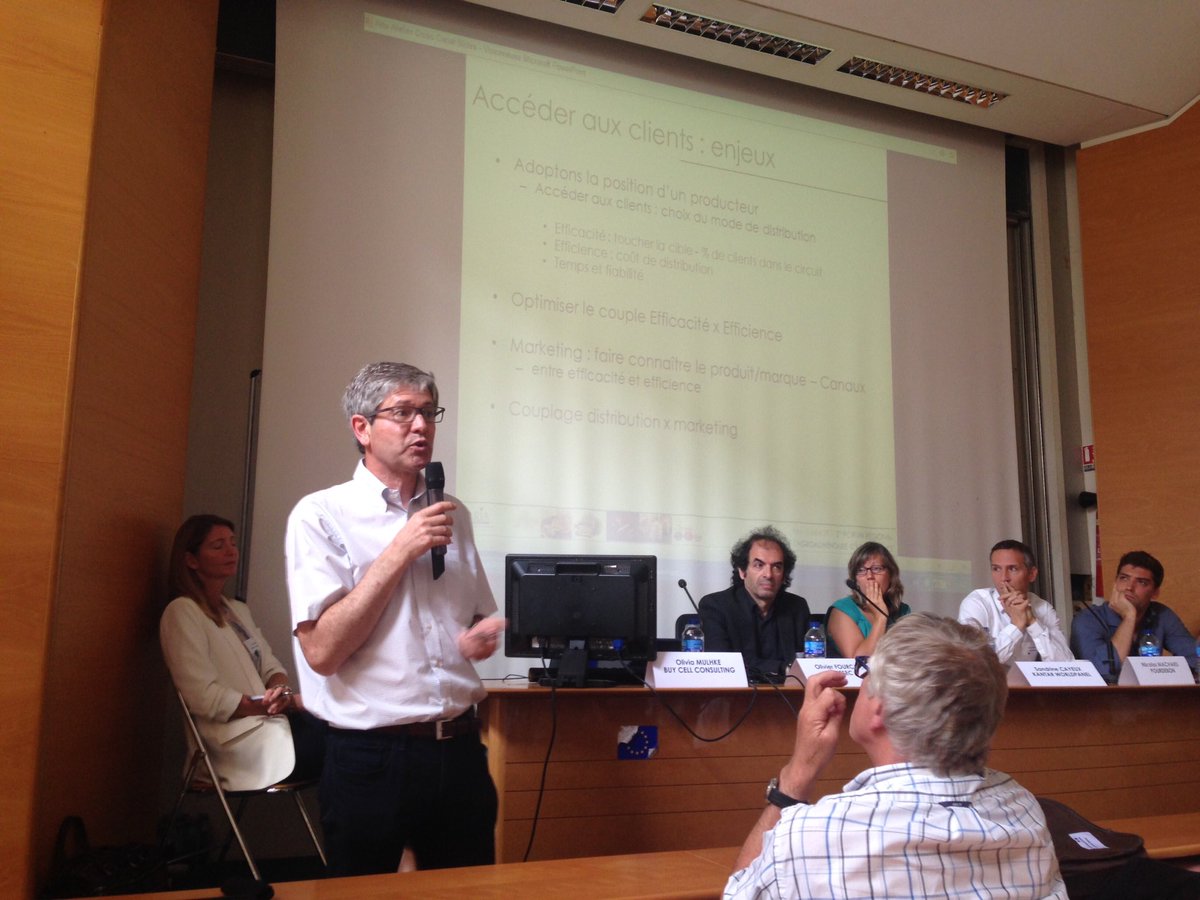

CALL FOR PAPERS
February 22-23, 2018
Collège des Bernardins, Paris,
France
Coping with risks in
agriculture: what challenges and prospects?
CHALLENGES
AND CONTEXT
Agriculture is a particularly complex sector
due to multiple risks and uncertainties farmers face at different levels (farm level,
international level…). Farmers are confronted to risks whose likelihood and
frequency increase:
· Price volatility is a major issue
for farmers with the liberalization of agricultural markets and the CAP reform;
· Quality and price requirements of
the agri-food, mass retailing sectors, and an increasingly restrictive
legislation reduce farmers’ room to maneuver and their bargaining power;
· Global warming represents a
substantial challenge in developed and developing countries. This
phenomenon causes an increase in the frequency of extreme events (floods,
drought…) which lead some countries to offer crop insurance (e.g. France) or other
instruments (microfinance…);
· Agriculture adopts new technologies
(robots, GMOs, nanotechnologies, big data…) that can represent new risks and
opportunities for farmers.
OBJECTIVES
The objective of this international symposium
is to bring together international researchers in social sciences (economics, management,
law, sociology, anthropology, history, geography, political science, philosophy,
agronomy…) and agricultural professionals (farmers, agricultural chambers,
cooperatives, ministries and other public authorities, insurance companies,
agricultural experts, unions, banks, agribusiness firms…) to answer several
questions that arise in agriculture. What is the offer and demand of risk
management instruments? How do farmers perceive risks today? What different
strategies do they develop to handle risks (on-farm instruments or market
instruments such as insurance or futures markets)? How do farmers manage risks ex ante (diversification, marketing and
production contracts, insurance…) and ex post (adaptation strategies following
the occurrence of an event)? How can farms become more robust and resilient to
overcome extreme events? What should the role of agricultural policy as regards
agricultural risk management be? What do we make of the past agricultural
policies in various countries of the globe?
This symposium will allow an update on the
state-of-the-art in risk management in agriculture, with the feedback and
experience of agricultural professionals and research results from
international academics of the social sciences. The goal of this conference is
to contribute to a joint reflection on the challenges farmers are facing today
in terms of risks and how they cope. This symposium aims at providing guidance
to farmers and policy-makers for a more viable and resilient agriculture.
The conference will be
in English and French languages (simultaneous interpretation service will be available for the
plenary sessions).
SCIENTIFIC
TOPICS
All conference
proposals on risks in agriculture are welcome. Contributors are encouraged to
develop proposals on sensitive issues and emerging challenges on risks in
agriculture in developed or developing countries. Proposals may focus on the following themes (but
are not limited to this list):
· Risk management instruments and actors (agricultural
cooperatives, insurance companies, contracts, futures…)
· Risk and diversification strategies (wood sector,
agricultural methanization, biofuels, agrotourism, short supply chains…)
· Risk, public policy and regulatory development (CAP,
CETA, TAFTA…)
· Risk and uncertainty linked to the complexity of the
farming sector
· Farmers’ risk perceptions, attitudes and aversion
· Organization of agro-food sectors and price and
quality risks for farmers
· Agricultural crisis/es and learning process
·
New technologies, opportunities and risks
· Quality and food safety in food chains
· Liberalization of agricultural markets and price
volatility
· Mitigation and adaptation strategies to climate change
in developing and developed countries
· Agriculture, risks and natural resource management
(water, soils…)
·
Occupational risks in agriculture
· Adaptation to risk and resilience in agriculture
·
Risks and urban agriculture
· Complementarity between agricultural systems and risk
management
CALENDAR
Communications and proposals for workshops
|
Deadline
|
Proposals for workshops
1-2 pages, including theme, the name of the
Coordinator, the summary of the workshop (300 words maximum) and the list of
contributors and their respective contributions
|
1er July 2017
The Scientific Committee's response: 1St August
2017
|
Proposals for communications
2-3 pages, including about 1000 words + 10
bibliographic references (in French or in English)
|
1St September 2017
The Scientific Committee's response: October 15,
2017
|
Communications (20 pages maximum) and workshops
in their final format
|
January 15, 2018
|
Symposium
|
February 22-23, 2018
|
ORGANIZATION
Format of
contributions: no specific format is
required. Papers must be based on a theoretical or epistemological, conceptual
(with or without mathematical modeling) or empirical approach (case studies,
field studies, econometrics, computational methods). Papers based on case studies,
on a state of empirical knowledge or a literature review are also welcome.
Contributions may be written by researchers (Scientific contributions) or
professionals (Studies).
*
Studies focus on an empirical analysis
(case studies, empirical surveys, sharing of experience) on risks in
agriculture. They will be evaluated on the quality of the collected
data/material, the originality, implications, coherence, and ability to have a
critical eye on the results.
*
Scientific contributions focus on a theoretical, conceptual
and/or empirical approach based on scientific references regarding risks in
agriculture. They shall be appraised according to the originality of the method
and analysis, quality of results, theoretical and/or empirical input compared to
existing literature.
Apart from individual
papers, we also encourage:
Ø Workshops: a coordinator proposes a workshop theme whose program
and animation will be under his/her responsibility. The workshop proposal must
mention the theme, name of coordinator, a summary of the workshop (500 words
maximum) and a list of speakers, their
laboratory/university/school/institution, and the title of their respective
contributions. Each workshop lasts 2 hours maximum.
Publication: the best contributions will be selected for
publication (peer-reviewed journals) that will be further specified.
Participants: the conference is open to all scholars,
professionals, PhD students, and students interested in the theme of the
symposium on registration.
REGISTRATION
The registration for the
Conference will be recorded after payment. Fees cover coffee breaks and lunch.
Gala fees (evening of the 22nd of February) represent 50 euros
extra.
Ø
'Early bird' registration until December 10, 2017: 120 euros (students) and 240
euros (researchers and professionals)
Ø
Students (after December 10, 2017) registration fee: 150 euros
Ø
Researchers and professionals (after December 10, 2017) registration
fee: 300 euros
ORGANIZING COMMITTEE: Sylvie Lupton (INTERACT, UniLaSalle),
Nalini Rakotonandraina (INTERACT, UniLaSalle),
Loïc Sauvée (INTERACT, UniLaSalle), Hanitra Randrianasolo (University of
Paris-Sud, UniLaSalle), Michel Dubois
(INTERACT, UniLaSalle), François
Delaisse (Groupama Paris Val de Loire), Estelle Escamilla (Groupama Paris Val de Loire), Thierry Dechêne (Groupama Paris Val de
Loire)
SCIENTIFIC
COMMITTEE: Zohra Bouamra-Mechemache (Toulouse School of Economics, INRA), Ben Bradshaw (University of
Guelph), Jean Cordier (AgroCampus Ouest), Toni Darbas (CSIRO), Yann De Mey (ILVO, Wageningen
University), Michel Dubois
(INTERACT, UniLaSalle), Muriel Figuié (CIRAD, UMR MOISA,
Montpellier), Robert Finger (ETH Zürich), Alberto
Garrido (Universidad Politécnica de Madrid), Françoise Gérard (CIRAD,
UPR GREEN, Nogent-sur-Marne), John Brian Hardaker (University
of New England), Raymond Jussaume
(Michigan State University), Richard Just (University of
Maryland) , Sylvie Lupton
(INTERACT, UniLaSalle), Bill Malcolm (University of Melbourne), Nadine Marshall (CSIRO),
Miranda Meuwissen (Wageningen University), Hanitra
Randrianasolo (University of Paris-Sud, UniLaSalle), Daniel Rodriguez (University of Queensland), Carla
Roncoli (Emory University), Pascal Salembier (Tech-CICO, Université de Technologie
de Troyes), Loïc Sauvée
(INTERACT, UniLaSalle), Nicola Shadbolt
(Massey University), Ganesh Shivakoti
(Arizona State University, AIT Bangkok), Vincent Smith (Montana State University), Inès Sneessens (ICEDD), Joshua
Woodard (Cornell University), Bryan Wynne (Lancaster
University), Milad Zarin-Nejadan (University of Neuchâtel)
-->










